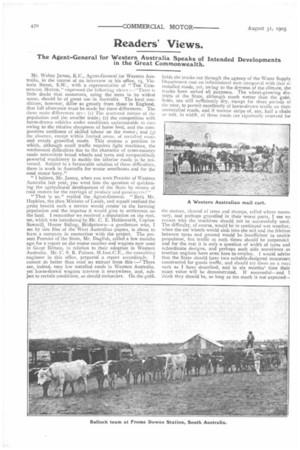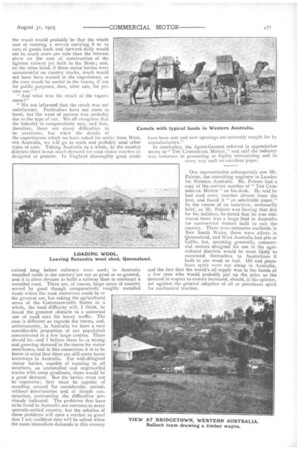Readers' Views.
Page 6

Page 7

If you've noticed an error in this article please click here to report it so we can fix it.
The Agent-General for Western Australia Speaks of Intended Developments in the Great Commonwealth.
Mr. Walter James, K.C., Agent-General for Western Australia, in the course of an interview at his office, 15, Victoria Street, S.W., with a representative of "THE COMAtb:RCIAL MOTOR," expressed the following views :—"There is little doubt that. motorcars, using the term in its widest sense, should be of great use in Australia. The local conditions, however, differ so greatly from those in England, that full allowance must be made for these differences. The three main differences are : (1) The scattered nature of the population and the smaller trade; (2) the competition with horse-drawn vehicles under conditions unfavourable to cars owing to the relative cheapness of horse feed, and the comparative costliness of skilled labour on the motor; and (3) the absence, except within limited areas, of metalled roads and evenly gravelled roads. This creates a position in which, although small traffic requires light machines, the niechanical difficulties due to the character of cross-country roads necessitate broad wheels and tyres and comparatively powerful machinery to enable the inferior roads to be traversed. Subject to a favourable solution of these difficulties, there is work in Australia for motor omnibuses and for the road motor lorry."
" I believe, Mr. James, when you were Premier of Western Australia last year, you went into the question of quickening the agricultural development of the State by means of road motors for the carriage of produce and passenz:ers?"
"That is so," replied the Agent-General. " Both Mr. Hopkins, the then Minister of Lands, and myself realised the great benefit such a service would render to the farming population and the impetus it would give to settlement on the land. I remember we received a deputation on the matter, which was introduced by Mr. C. E. Holdsworth, Coplow Sawmill, Hester Siding, Bridgetown—a gentleman who, I see by late files of the West Australian papers, is about to form a company in connection with the project. The present Premier of the State, Mr. Daglish, called a few months ago for a report on the motor coaches and wagons now used in Great Britain, in relation to their adoption in Western Australia. Mr. C. S. R. Palmer, M.Inst.C.E., the consulting engineer in this office, prepared a report accordingly. I
cannot do better than read an extract from this There are, indeed, very few metalled roads in Western Australia, yet horse-drawn wagons traverse it everywhere, and, subject to certain conditions, so should motorcars. On the gold
fields the tracks cut through the agency of the Water Supply Department cost an infinitesimal sum compared with that metalled roads, yet, owing to the dryness of the climate, the tracks have served all purposes. The wheat-growing districts of the State, although much wetter than the goldfields, are still sufficiently dry, except for short periods of the year, to permit excellently of horse-drawn traffic on their unmetalled roads, and if narrow strips of, say, half a chain or 2oft. in width, of these roads are rigorously reserved for the motors, cleared of trees and stumps, rolled where necessary, and perhaps gravelled in their worst parts, I see no reason why the machines should not be successfully used. The difficulty, of course, would be in continued wet weather, when the car wheels would sink into the soil and the friction between tyres and ground would be insufficient to enable propulsion, but traffic at such times should be suspended. and for the rest it is only a question of width of tyres and subordinate designs, and perhaps such aids sometimes as traction engines have even here to employ. I would advise that the State should have two suitably-designed motorcars constructed for goods traffic, and should try them on a road such as I have described, and in six months' time their exact value will be demonstrated. If successful—and I think they should be, so long as too much is not expected—
the result would probably be that the whole cost of running a service carrying 8 or re tons of goods back and forward daily would not be much more per milt than the interest alone on the cost of construction of the lightest railway yet built in the State ; and, on the other hand, if these motor lorries were unsuccessful on country tracks, much would not have been wasted on the experiment, as the cars would be useful in the towns, if not for public purposes, then, alter sale, for private use.' " "And what was the result of the experiment?"
"We are informed that the result was not satisfactory. Particulars have not come to hand, but the want of success was probably due to the type of car. We all recognise that the industry is comparatively new, and that, therefore, there are many difficulties to be overcome, but when the details of the experiments which we have asked for arrive from Western Australia, we will go to work and probably send other types of cars. Taking Australia as a whole, in the country districts there is not much demand for road motor coaches as designed at present. In England thoroughly good roads existed, long before railways were used ; in Australia metalled roads in the country are not so good or so general, and it is often cheaper to build a railway than to construct a metalled road. There are, of course, large areas of country served by good though comparatively roughly metalled roads where the road motorcars could be oi the greatest use, but taking the agricultural areas of the Commonwealth States as a whole, the road difficulty will, I think, be found the greatest obstacle to a universal use of road ears for heavy traffic.. The case is different as regards the towns, and, unfortunately, in Australia we have a very considerable proportion of our population concentrated in a few Large centres. There should be—and I believe there is—a strong and growing demand in the towns for motor omnibuses, and in this connection it is to be borne in mind that there are still many horse tramways in Australia. For well-designed motor lorries, capable of running in all weathers, on unmetalled and ungravelled tracks with steep gradients, there would be a good demand. But the lorries must not be expensive ; they must be capable of standing unused for considerable periods without deterioration and of simple construction, overcoming the difficulties previously indicated. The problems that have to be faced in Australia are common to every sparsely-settled country, but the solution of those problems will open a market so great that I am confident they will be solved when the more immediate demands in this country
have been met and new openings are earnestly sought for by manufacturers."
In conclusion, the Agent-General referred in appreciative. tem ms to" THE COMMERCIAL MOTOR," and said the industry' was fortunate in possessing so highly enterprising and in., every way such an excellent paper.
Our representative subsequently saw Mr. Palmer, the consulting engineer in London for Western Australia. Mr. Palmer had a copy of the current number of "THE COMMERCIAL MOTOR " on his desk. He said he had read every number almost from the first, and found it " an admirable paper." In the course of an interview, necessarily brief, as Mr. Palmer was leaving that day for his holidays, he stated that he was convinced there was a large field in Australia for commercial motors built to suit the country. There were extensive coalfields in New South Wales, there were others in Queensland, and West Australia had pits at Callie, but, speaking generally, commercial motors designed for use in the agricultural districts would be most likely to commend themselves to Australians if built to use wood as fuel. Oil and petroleum spirit were not cheap in Australia, and the fact that the world's oil supply was in the hands of a few men who would probably put up the price as the demand in respect to motors increased, should, in his opinion, act against the general adoption of oil or petroleum spirit for mechanical traction.
























